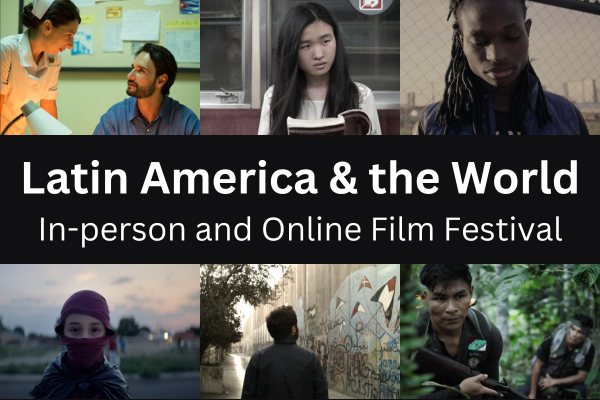"Latin America and the World" Film Festival

In Fall 2023, the Center for Latin American Studies will host the Latin America and the World film festival, in partnership with Columbus State Community College. Each of the six films in the festival is co-sponsored by the Area Studies Center and/or academic department to which it most directly relates.
Each film connects Latin America with one or more other world regions and emphasizes the global, interconnected nature of conflicts, cultures, and experiences. The films take place in a variety of settings, address a wide range of themes, show the perspectives of diverse communities, and feature multiple languages (though all films have English subtitles).
To attend the festival (or to access the film through streaming on specific dates) you will need to register for each film on the event pages listed below. The films include:
- Sept. 6 (Wed.) -- Un traductor (2018, Cuba/Canada): Based on the true story of 20,000 Chernobyl victims who were treated in Cuba, Un Traductor tells the story of a Russian literature professor tasked with translating between Cuban doctors and the families of the patients. Meanwhile, life around all of them shifts as the "Special Period," the economic crisis in Cuba that followed the dissolution of the Soviet Union, begins.
Primary cosponsor: Center for Slavic, East European & Eurasian Studies
- Sept. 13 (Wed.) -- The Future Perfect (2016, Argentina): Xiaobin, a Chinese girl of 17, emigrates to Argentina. Unable to speak Spanish, she works in a Chinese grocery store to raise money for language lessons. She meets an Indian customer named Vijay, and although they can barely communicate, they begin a secret romance. As Xiaobin learns to use the Spanish conditional, the form of possibility, she starts thinking about the future.
Primary cosponsor: East Asian Studies Center
- Sept. 21 (Thurs.) -- Perro Bomba (2019, Chile/France): Steevens is a young Haitian immigrant living a precariously balanced life in Santiago de Chile. Everything is disrupted when a childhood friend arrives illegally in Chile seeking assistance to establish himself. Initially, Steevens does everything to support his friend and even gets him a job with his employer, but an incident at their workplace erupts racial tensions and stokes a large anti-immigration sentiment in the city. In Perro Bomba, director Juan Cáceres subverts conventions of narrative films and poses questions about global migration in an effort to promote empathy and global activism.
Primary cosponsors: Center for African Studies and Dept. of French & Italian
- Sept. 28 (Thurs.) -- Los Lobos (2019, Mexico): Brothers Max and Leo, together with their mother Lucía, have just crossed the border from Mexico into the United States in search of a better life. But it is not easy for them to gain a foothold in their new home country. While waiting for Lucia to return from work, the kids build an imaginary universe with their drawings and think about mom’s promise of “Disneyland”, their land of dreams. Los Lobos is a coming-of-age story about migrant life through the prism of its most innocent figures.
Primary cosponsors: Dept. of Spanish & Portuguese and Latina/o Studies
- Oct. 4 (Wed.) -- The Territories (2017, Argentina/Brazil): After an attack on the offices of a French satirical newspaper, Iván, a young film producer and self-described 'frivolous' son of a prominent Argentine journalist, embarks on a journey through contemporary geopolitical conflicts. That is not easy. From Greece to the less-democratic Brazil, from the Basque Country to Jerusalem, Granovsky is always too late, too early or in the wrong place. Even more difficult is answering the question of where the front line ends and the ego trip of the would-be war journalist begins.
Primary cosponsor: Middle East Studies Center
- Oct. 18 (Wed.)-- This Stolen Country of Mine (2022, Germany): Chinese mining in Ecuador’s mountains sets the stage for an epic battle between eco-guerrillas and a corrupt government in an intensely dramatic documentary. The film follows the resistance of Indigenous groups and journalists to this exploitation and exposes how China has used the Ecuadorian government to turn the country into one of its new colonies.
Primary cosponsor: East Asian Studies Center
Each film will be screened in two ways. First, with an evening screening (either Wed. or Thurs.) in Hagerty Hall 180, 6 - 9 PM, accompanied by a Q&A with a panel of regional and topical experts. We encourage anyone who can to attend these in-person screenings; however, interested audiences will also be able to register to receive a link for two weeks of online streaming access for each film.
We hope you'll join us! Please direct any questions about the film festival to CLAS Outreach Coordinator Julio Beltrán (beltrantapia.1@osu.edu).
The film festival is made possible with the support of Pragda, SPAIN arts & culture, and the Secretary of State for Culture of Spain.

